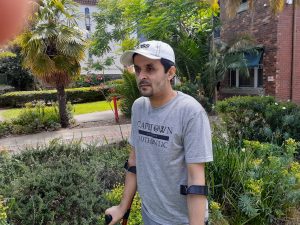Afghan family reunited after decade-long ordeal
An Afghan refugee living in Melbourne has been reunited with members of his family he has not seen for more than nine years.
Dr Abdulatif Stanikzai, who fled Afghanistan in 2014 after becoming a target of a Taliban execution squad, has been reunited with his mother, two brothers and their wives and children – who make up a 14-strong group of extended family members who have arrived in Australia on humanitarian visas.
But he is still desperately worried about other members of his family, including his younger brother, who are still missing.
Dr Stanikzai even travelled to Turkey to try to find family members.
“I heard word from a family friend that my brother was in Turkey and I went to try to find him,” he said.
 But after twenty days Dr Stanikzai, who suffers from several physical ailments, became ill and was forced to abandon his search.
But after twenty days Dr Stanikzai, who suffers from several physical ailments, became ill and was forced to abandon his search.
But he is grateful to have some members of his family safe in Australia.
“I am happy that my family members have finally arrived after so long,” he said.
He told the horrific story of his family’s fate after the Taliban took control of the capital Kabul in August 2021.
He said his elder brother and two teenaged nephews were gagged, bound and abducted from his family’s home, other members of his family were beaten and his elderly, ailing mother was kicked by Talban thugs.
Like thousands of others, his family made desperate attempt to flee the strife-torn country via Kabul’s international airport. But they were unable to get on an aircraft and left with few options.
He told how the Taliban came to his family’s home and broke in.
“They used some kind of explosive to break the door down. They smashed the house up, breaking everything and beating my family members,” he said.
“They blindfolded and tied my elder brother and his two sons – they are 18 and 16 years old. My brother had been in hiding since the Taliban resurgence and had only just come back to our family home,” Dr Stanikzai said.
After being released, the family members fled to a remote part of Afghanistan
“They were lying low, living quietly. An uncle of ours helped them with food and money for a while but he too was eventually put in prison, Dr Stanikzai said.
His family eventually made their way to Iran and then Qatar before receiving visas to come to Australia
They are being supported by migrant and refugee settlement agency AMES Australia and will soon move into their own house.
Dr Stanikzai, a trauma surgeon, became a target of the Taliban and fled his homeland after terrorists who had been wounded in a gun battle with police later died of their wounds in his hospital.
Despite the best efforts of Dr Stanikzai and his team, the men could not be saved. And just days later came a chilling message from the dead men’s comrades: ‘you killed our people, we are coming for you’.
From this point Dr Stanikzai was catapulted into a cascading series violent terror attacks. He was shot three times, members of his family were murdered and he was finally forced to flee for his life.
As a result of being targeted, he was advised to leave country.
“I was given a passport and documents and I went to Dubai and then to Indonesia. The Afghan Government supported me to live in Indonesia. I could pay rent and I even managed to get some work as a doctor with the Red Cross helping other refugees,” he said.
After five years In Indonesia, where had was linked to IOM and then UNHCR, Dr Stanikzai was given status as a refugee.
Given the choice of going to the US, Canada or Australia, he chose Australia.
Before leaving for Australia, Dr Stanikzai had a motor cycle accident and suffered a small injury to his leg. On arrival in Adelaide in April 2019, Dr Stanikzai was referred to a plastic surgeon for skin graft surgery on the injury. Ironically, this was a procedure Dr Stanikzai had performed successfully himself dozens of times.
The surgery led to an infection and Dr Stanikzai ended up unconscious in hospital with septic shock and septicaemia. He endured 13 further operations to ty to repair the damage.
Eventually his case workers at refugee settlement agency AMES Australia transferred him to Melbourne in April 2020 where more sophisticated treatment was available.
He was linked to the National Disability Insurance Scheme (NDIS) and is receiving support.
His priority for the past five years has been bringing his family to safety.
“I had a good life in Afghanistan despite the security situation. I had a good job that I loved, helping ordinary people. And I was engaged to be married. But this is my life, this is what I have been given,” said a phlegmatic Dr Stanikzai.












